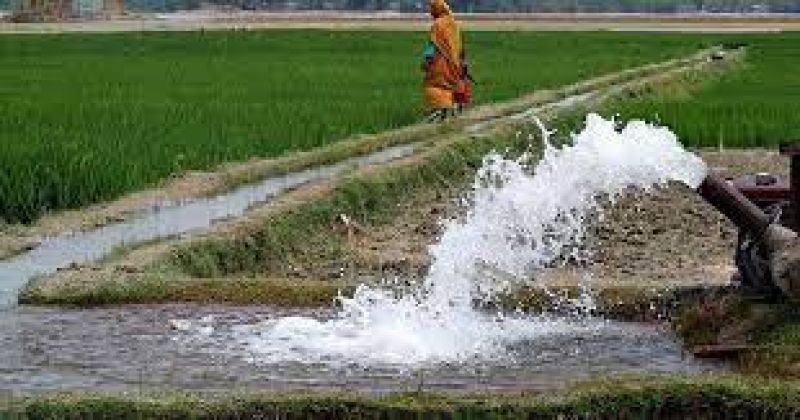- Inqilab Monch Seeks Home Adviser’s Exit |
- UN Calls for Calm in Bangladesh After Protest Leader’s Killing |
- DMP issues 7 traffic directives for Osman Hadi’s Janaza |
- Vested quarter fuelling chaos to impose new fascism: Fakhrul |
- Hadi’s namaz-e-janaza at 2:30pm Saturday |
Transforming Lives Through Climate-Resilient Irrigation
Game Changers for a Livable Planet

Irrigation water being lifted in a field in Bangladesh
Many of the world’s poor are farmers. But all too often, crops that once blossomed on the verdant fields of small, rain-fed family farms now thirst for water from drought and soaring heat.
More—and better managed—climate-resilient irrigation will help feed the planet with available water, strengthen livelihoods, grow economies and create jobs, reduce greenhouse gas emissions, and build resilience to climate shocks.
It’s a game changer.
Ndiaye, Akin, and millions more around the world struggling with poverty and climate change shocks such as erratic rainfall, droughts, and floods are adopting climate-resilient irrigation, which helps lessen water stress, increase crop yields and agricultural productivity, enable crop diversification, and lower food prices. It could feed 1.4 billion more people.
Climate-resilient irrigation more than doubles productivity compared to rain-fed agriculture and helps farmers produce more from less—less land and less water.
With the planet’s population expected to skyrocket by 2050—dramatically increasing the demand for food—embracing sustainable irrigation practices is not an option. It’s essential.
L e Dong Phuong is a rice farmer in Can Tho City in the Mekong Delta—known as the Rice Bowl of Viet Nam, one of the world's largest rice producers and exporters.
"Rice thrives on water," she explains.
That’s a problem because, when farmers continuously flood their fields to cultivate rice, tons of methane—a powerful contributor to climate change—are released into the atmosphere.
At the same time, Viet Nam ranks among the top five most climate-vulnerable countries. The Mekong Delta, home to 1.4 million rice-growing households, is at great risk from floods, drought, sea level rise, and saltwater intrusion.
Rice farming contributes three-quarters of methane emissions from Viet Nam’s agriculture sector.
But now the Viet Nam Sustainable Agriculture Transformation Project is significantly reducing water use and methane emissions while equipping over 156,000 rice-farming households in the Mekong Delta with practices to produce more higher-quality rice that boost livelihoods and contribute to sustainability.
It's a triple win for communities.
As part of the project, the International Rice Research Institute is deploying high-tech methane-tracking technology on 40 farms in the city of Can Tho. The intel empowers farmers to slash methane emissions with climate-smart practices.
Now, instead of constantly flooding their fields, farmers use the Alternate Wetting and Drying technique, intermittently drying out the fields because plant roots have enough water from earlier flooding.
Sensors monitor water levels every five minutes, and a smartphone application alerts farmers to stop or restart watering, optimizing the amount of water used with the click of a button.
The project helped reduce greenhouse gas emissions by 1.5 million metric tons of CO2 equivalent because of methane emission reduction.
Inspired by the project’s success and supported by the World Bank Group, the Government of Viet Nam has decided to launch an ambitious effort to scale-up these sustainable practices into one million hectares in the Mekong Delta Region, reducing carbon emissions by up to 10 million tons by 2030.
surging population. Fragility and conflict. Drought. Challenges abound in the Sahel, which stretches across the vast semi-arid plains of West and Central Africa.
Droughts and unpredictable rainy seasons could force 13.5 million more Sahelians into poverty by 2050, and decrease water availability by up to 70 percent by 2100.
That spells trouble for the two-thirds of Sahelians who live in rural areas and depend on rainfed farming for their livelihoods. Less than 1 percent of cultivated land is irrigated.
The Sahel Irrigation Initiative Support Project aims to change that. Funded by the World Bank’s International Development Association (IDA), the project is financing efficient and innovative solutions to develop climate-resilient agriculture to improve the livelihoods of 390,000 farmers across 2,000 sites.
The project is funding irrigation systems such as drip and spray irrigation, solar water pumping, and collection of surface water.
Now farmers are no longer at the mercy of unpredictable rainfall.
Globally, 2.6 million farmers adopted improved agricultural and irrigation practices with IDA support, including almost 600,000 farmers in fragile and conflict-affected countries.

